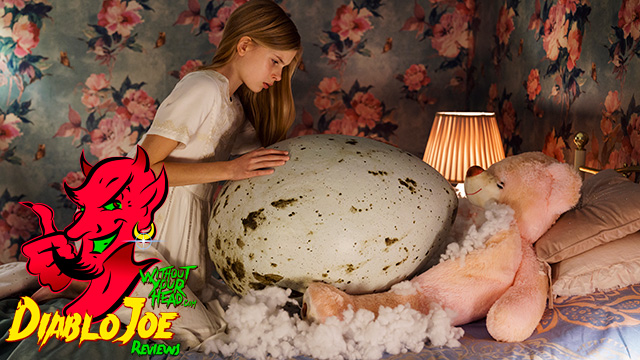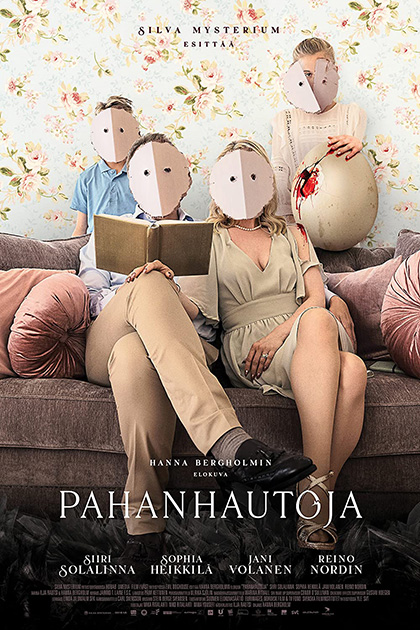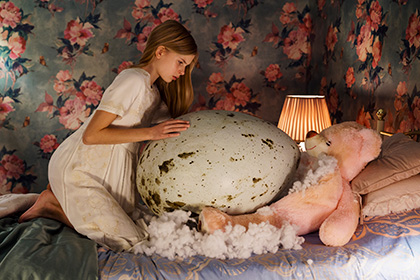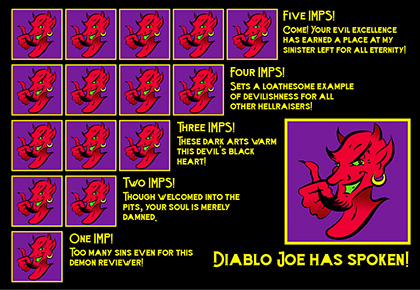

Saturday January 29, 2022 | Diablo Joe Reviews | Neal
"Hatching" from IFC Midnight
review by Diablo Joe

"Hatching"
Young Tinja, a budding gymnast, struggles to live up to the expectations of everyone around her. She lives with her overassertive mother, passive, emasculated father, and spoiled little brother. When Tinja discovers a mysterious egg one night, she nurtures it until it hatches. In a grotesque parody of Tinja’s efforts with her family, this new life seeks to please Tinja with only horrific and terrifying results.
Coming to us from Finland and IFC Films, “Hatching” is a combination of dark fairy tale, coming of age story, and body horror. As it attempts to fulfill these various stylistic elements, the film also mirrors its main character's struggle. It produces expectations for itself that are hard to realize. The result is a movie with promise and flashes of brilliance that never quite sticks the landing (pun intended).
There are many reasons for the film’s deficiencies, but they mostly come down to an issue of style. “Hatching,” in trying to be so many things, never develops a cohesive identity. Nowhere is this more evident in the disparity between Tinja’s family and home with the rest of the world. Tinja’s mother is obsessed with presenting an image of perfection, so much so that she has created a vlog to highlight her “perfect” family when they are anything but that. Mother’s first words in the film are, “Aren’t I terrible? I am.” And she speaks the truth here. She is domineering, projecting her unfulfilled desires upon her daughter and using the rest of her family as smoke and mirrors of happiness. Tinja’s cuckold father is willfully both knowing and blind to his wife’s infidelity. Younger brother Matias is a positively insufferable whining sycophant.
The trio almost borders on parody. Mother’s clothing would look perfect on one of the wives in Stepford, while Father’s pastel polos (often mirrored by his son) and sweaters tied at the neck verge upon caricature, particularly when paired with his sadly obsequious grin. Their house is likewise all crisp corners and floral prints. Do people live this way? Perhaps, but it seems a too-on-the-nose attempt to create a fairytale environment (that the film gives neither parent a name furthers this notion). Contrast these elements with the workaday sweatsuit of Tinja’s gymnastics coach and the farmhouse milieu of Mother’s lover Tero’s house (though the latter’s leather suspenders and hatchet in hand seem to suggest he may be playing the Woodsman role in this fable). The two worlds come across as just a bit too incongruent.

Thematically, “Hatching” wants to be a cautionary tale of the dangers of trying to please everyone, the importance of being motherly love, and seemingly several other messages. Is Tinja’s caring for the hatchling an allegory for herself and Mother? Is the creature supposed to be an extension of Tinja’s anxieties, as it often seems to be? If the latter, then why are its efforts so misguided? The thing horribly punishes those who don’t truly deserve it while relatively sparing some of the worst characters in the film (such as the thoroughly unlikeable turd, Matias).
The hatchling itself executed very well. A combination of practical effects and choice digital work, it initially resembles a cross between a gangly skeleton and a Skeksis. It takes on different forms as the film progresses, and the evolution is quite chilling at times. Kudos to everyone in the various effects department for their sterling work here.
“Hatching” is not a bad film, just one that overreaches. It desperately wants to occupy the same genre space as the films of Guillermo Del Toro but instead comes off as far too heavy-handed. In trying to drive its concepts home, the movie mars all of its messages so that no one idea ever properly resonates. Like Tinja, “Hatchling” is just too eager to please.
This devil of a reviewer gives “Hatchling” 2.5 out of 5 imps.

